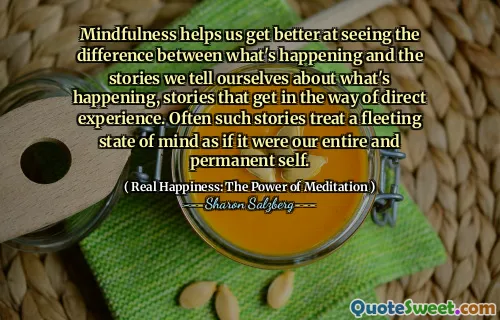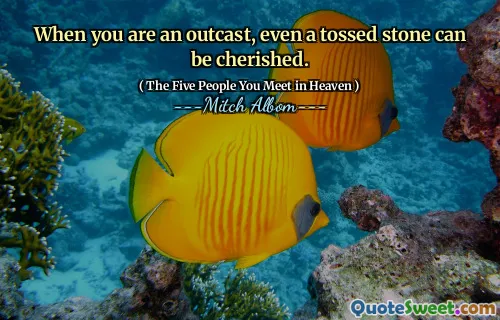
Mindfulness helps us get better at seeing the difference between what's happening and the stories we tell ourselves about what's happening, stories that get in the way of direct experience. Often such stories treat a fleeting state of mind as if it were our entire and permanent self.
The essence of this quote lies in the transformative power of mindfulness. In our daily lives, our perceptions are often clouded by narratives we unconsciously create around our experiences. These stories act as filters, coloring our understanding and emotional responses, sometimes distorting reality. Mindfulness serves as a crucial practice that cultivates awareness of the present moment, allowing us to observe our thoughts and emotions without attachment or judgment. By doing so, we develop the skill to distinguish between the actual experience—what is truly happening—and the interpretative stories we overlay onto it. This differentiation is vital because it prevents us from conflating fleeting thoughts or feelings with our core identity. When we mistake transient states for our permanent self, we risk unnecessary suffering and identity confusion. Practicing mindfulness can reveal these stories as constructs, giving us space to respond y calmly and intentionally rather than react impulsively based on false beliefs about ourselves. The more we sharpen this clarity, the less power these narratives hold over us, leading to a more authentic and liberated experience of life. Recognizing the temporary nature of our mental states can also foster compassion towards ourselves and others, acknowledging that everyone is subject to change and impermanence. Ultimately, mindfulness invites us to experience life directly, unfiltered and pure, cultivating inner peace and a profound sense of presence. This practice aligns well with the teachings in Sharon Salzberg’s 'Real Happiness,' emphasizing that true well-being arises when we learn to see beyond stories to the reality of the present moment.

